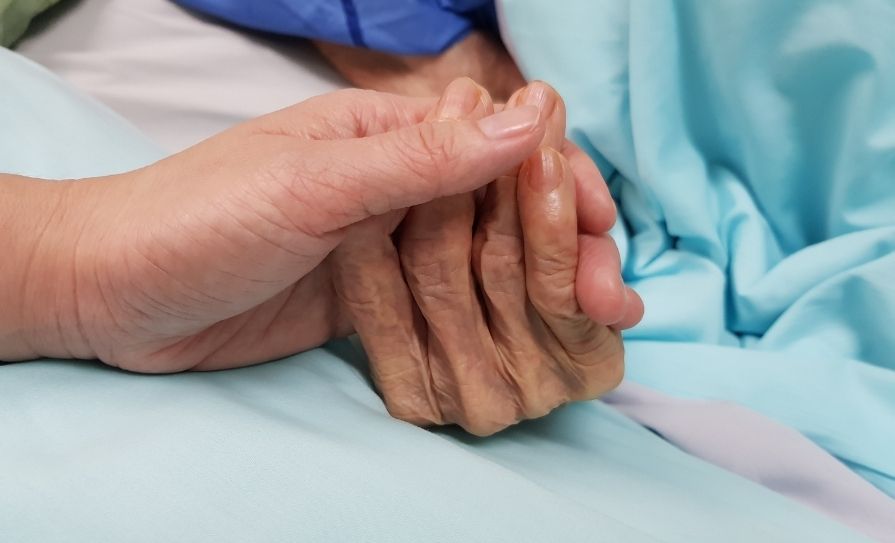
As I listened to her, I realised how worries about tea towels and shoes masked deeper fears
She wasn’t worried about her husband. He would be grand. They were silly, really, the things that bothered her. Like having a dirty tea towel in the kitchen and someone calling for a cup of tea and him using that tea towel to dry the cup. What would they think? Or that he would leave his shoes sticking out from under the bed instead of putting them back on the shoe rack in the walk-in wardrobe. She hated it when he did that. You see, the house was her bailiwick and she couldn’t bear to think what would happen to it when she was gone.
She couldn’t possibly be worried about these things, I thought. But then again, what did I know? I was always making assumptions about people. Hovering in the gap between what they said and what they meant. Coming up with my own clever conclusions. Who knew if I was right or wrong? And what did it matter anyway? People wanted to be heard, not analysed.
And yet, I couldn’t help trying to figure her out. The previous week she had sat in the same chair and displayed remarkable acceptance. Her diagnosis was not good. No timeframe, but every day was a bonus. She didn’t fear illness or dying. She trusted the professionals to ease her path in that regard. Neither of us had mentioned the ‘d’ word or any of its many euphemisms, but there was no ambiguity. We both knew what she was talking about. So, why the present anxieties about tea towels and shoes?
I was doing it again. Creating a narrative. And while there was nothing wrong with that, it meant that I wasn’t really listening. I tuned back in. She was saying how the house had been her life’s work. Her greatest achievement, she felt. From the beginning, she had decided everything: The furniture, the fittings, curtains or blinds, where to place the lamps and rugs, when to re-decorate, paint type, and colour. He had no interest in these things, her husband, didn’t see them, even though she was the one with poor eyesight. Alone in the house on a winter evening, he wouldn’t even turn on the lamps. She would come in and find him sitting beneath the dull, dim light of a single overhead bulb. And the garden. He wouldn’t know weeds from flowers. It would become overgrown and desolate in no time. She knew it would.
Perhaps he could move out, she thought. They could sell it now while it was still desirable. Or just pretend to sell. Put it on the market and showcase it. Just so that she could see peoples’ reactions, hear their appreciative remarks. But that was ridiculous. Her family would never allow that.
I wondered if these thoughts had just come to her or if they had been going round in her head for a while, but before I could ask, she started talking again. She had stopped working ‘outside the home’ once they were married. Before that, she had been a clerk in the local post office. She never missed her work once she left. She could never understand how some women managed so many roles: Children, house, husband, pets. How many hours had she spent walking the dog, taking it to the vet, consoling the children when it died? How many hours doing the washing, sorting, folding, ironing, hoovering, dusting, washing windows and floors? There would have been no time for work. Even after the children left home, her days were still full, as she reclaimed the space, adapting it once again to their needs, as in the days before children. A sanctuary, of sorts, for their old age.
And now it was all for nothing. All that time, attention, and effort wasted. She would leave it behind and it would never be the same without her. But before that, she would witness its decline. She would become ill in that house, watch dust settle on the tabletops, fluff gather on the carpet, bird droppings smudge the windows, and there would be nothing she could do about it.
She had thought that when her time came, she would have more important things to consider. Like how to make her last days meaningful. Words of wisdom for her children and husband that would sustain them when she was no longer around. She didn’t imagine that it would be tea towels, shoes, dust, and weeds that would keep her awake at night.
Another pause. She looked up finally, as if just remembering that I was there.
“I suppose you think I’m silly, Doctor,” she said, gathering her things, “worrying about something as trivial as housekeeping.”
“Not at all,” I said, at a loss for words for once. But it seemed that she had not expected a reply and was already moving towards the door.





Leave a Reply
You must be logged in to post a comment.